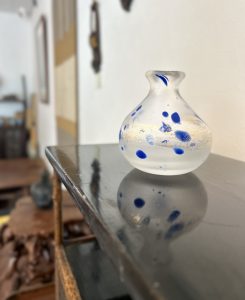ドラマ「舟を編む」面白かったです(愛知県名古屋市千種区姫池通 骨董買取 古美術風光舎)
2025.08.24

三浦しおんさんの小説「舟を編む」を元にしたドラマの再放送、毎週楽しみに観ていたのですがとうとう最終回を迎え寂しい限りです。
2013年に映画化された作品も見たのですが、なぜかドラマの方がはまってしまいました。映画は日本アカデミー賞6部門を受賞し高い評価を受けましたが、恥ずかしながら私、内容がうる覚えでドラマと何が違うのだろうと思っておりましたら、主人公が違うという決定的な違いがあり、違和感を感じながらも気づかずにドラマを観ていた自分に驚きました。
映画の主人公は辞書編集者の馬締光也(まじめ みつや)で、辞書編集に人生をかける実直な青年が恋愛などを通じ成長していくお話でした。主人公役の松田龍平さんがはまり役でこれ以上のキャストはないのではと感じたほどです。恋をしたのは宮崎あおいさん演じる林香具矢(はやし かぐや)。そうそうそういうストーリーだったとやっと思い出しました。
ドラマでは馬締光也役に現在の朝ドラの主題歌を作ったRADWIMPSの野田洋次郎さんが演じ、松田龍平さんに負けず劣らず馬締さんになりきっていて、その多彩さに驚きました。
そして主人公は映画ではキーパーソンとなる人物でしたが、素性などは詳しく描かれなかった岸辺みどりという女性。辞書編集に意味を見出せず、もがきながらも言葉や辞書に魅了されていく姿を池田エライザさんが見事に演じていました。妖艶なエライザさんの美しさに始終見とれておりました。
よくよく調べると原作小説の「舟を編む」は誰が主人公ということはなく群像劇的に仕上がっているということで、ドラマで違う登場人物の視点から描かれるのは自然なことなのかもしれません。原作を読んでいないのですが、今すぐにでも読んでみたい気持ちになっております。
つたないブログを書いておりますと、ふだん何気なく話している言葉を文字にしながら、なにか変?合ってる?などと日本語に自信が持てないことがしばしばあります。書いたブログを読み返すことはあまりないのですが、お恥ずかしい間違いや誤字脱字が多々あることと思います。
ドラマではたくさんの言葉が取り上げられておりましたが、たとえば「右」という言葉を説明するのに、「体を北に向けた時の東側」「10を書いた時の0(ゼロ)の側」などという意見が出ていて凄いと思いました。自分だったらと考えてみましたが、全ての人に同じ右をイメージさせるのはなかなか難しいことです。
他にも一つの意味しかないと思っていた言葉が複数の意味を持つこともあり、ドラマの中で「とことんあきらめてください」というセリフがあり、「諦める」という言葉しか浮かばない私は意味が分からず皮肉なのかと思いました。実はあきらめるには「明らめる」という漢字もあり「事実を明らかに見る、はっきりさせる」という意味もあるそうで入力変換にも出てきます。日本語って本当に奥が深いくて難しい。
また原作は読んでいないのですが、小説では「あがる」と「のぼる」についての考察が面白いのだそうです。主人公の馬締が香具矢からデートに誘われた時に「天にものぼる気持ちだ」と感じた瞬間、言葉の海に潜り始めます。「天にものぼる気持ち」とはいっても「天にもあがる気持ち」とはなぜ言わないのか。と香具矢の目の前で思想に耽り始めます。出した結論は、「あがる」は到達した場所に重点を置き、「のぼる」は上へ移動する過程に重点が置かれている。
山にのぼるとは言うが、山にあがるとは言わない。家に上がっていってとはいうが、家にのぼっていってとは言わない。階段を上がりながらと言ってしまいがちだが、本当は階段をのぼりながらが正しいのか。
一つ一つの言葉を深く考え出すときりがありませんが、それが辞書編集というお仕事なのでしょう。普段あまりにも何気なく使っているので、外国の人に違いの説明を求められても答える自信がありません。
そういえば昔、乗り物に乗るという英語で‘get in the car’ と‘get on the bus’のinとonの違いは何かという質問に外国人の先生が上手く説明できず、言語オタクの日本人生徒が的確に答えたということがありました。そう母国語というのはそんなものです。しかしせっかくなので母国語の日本語をもっとしっかりと学ばねばと改めて感じております。
それでは、また次の機会に。(スタッフH)
I had been looking forward to watching the reruns of the drama based on Shion Miura’s novel “The Great Passage” every week, but now that it has finally come to an end, I feel very sad.
I also watched the film adaptation from 2013, but for some reason, I found myself more drawn to the drama. The film won six Japan Academy Awards and received high praise, but to be honest, I couldn’t remember the details of the story and wondered what the difference was between the film and the drama. It turned out that the main character was different, which was a decisive difference, and I was surprised to realize that I had been watching the drama without noticing this discrepancy.
The protagonist of the movie is Majime Mitsuya, a dictionary editor who dedicates his life to dictionary editing, and the story follows his growth through love and other experiences. Matsuda Ryuhei, who played the protagonist, was so perfect for the role that I felt there couldn’t be a better cast. The one he fell in love with was Hayashi Kaguyo, played by Miyazaki Aoi. That’s right, that’s the story I remembered.
In the drama, the role of Mitsuya Majime was played by Yōjirō Noda of the music band RADWIMPS, who composed the theme song for the current morning drama. He was just as convincing as Ryūhei Matsuda in portraying Majime, and I was amazed by his versatility.
And the protagonist was a woman named Kishibe Midori, who was a key figure in the movie but whose background was not detailed. She couldn’t find meaning in dictionary editing, but she was fascinated by words and dictionaries, and Ikeda Eliza played her role beautifully. I was mesmerized by Eliza’s beauty throughout the movie.
Upon closer inspection, the original novel “Boat Weaving” is not a story with a single protagonist but rather an ensemble piece, so it may be natural for the drama to depict different characters’ perspectives. I haven’t read the original novel, but I now feel compelled to read it immediately.
When writing this clumsy blog, I often find myself lacking confidence in my Japanese, wondering if the words I casually use in everyday conversation sound odd or are correct when written down. I rarely reread my blog posts, but I’m sure there are many embarrassing mistakes.
In the drama, many words were discussed, such as the word “right.” Opinions included “the east side when facing north” and “the side of the zero when writing the number 10.” I tried to think about it myself, but it’s quite difficult to make everyone imagine the same direction.
There are also words I thought had only one meaning but actually have multiple meanings. In the drama, there was a line that said, “Give up completely,” and since the only word that came to mind was “give up,” I didn’t understand the meaning. Apparently, there’s also the kanji “明らめる” for “give up,” which means “to clearly see the facts, to make things clear,” and it even shows up in input conversion. It also seems to connect to the meaning of “give up.” Japanese is really deep and difficult.
I haven’t read the original work, but apparently the novel has an interesting discussion about the words “agaru” and “noboru.” When the protagonist, Madarame, is invited on a date by Kaguyama, he feels “like he’s ascending to heaven” and begins to dive into the sea of words. Even though he says “like he’s ascending to heaven,” why doesn’t he say “like he’s ascending to heaven”? He begins to ponder this in front of Kaguyama. The conclusion he reached was that “agaru” emphasizes the destination, while “noboru” emphasizes the process of moving upward.
We say “climb a mountain,” but we don’t say “ascend a mountain.” We say “go up to the house,” but we don’t say “climb up to the house.” We tend to say “while climbing the stairs,” but is “while ascending the stairs” correct?
There is no end to thinking deeply about each and every word, but that is probably what dictionary editing is all about. We use these words so casually in everyday life that I am not confident I could explain the differences to a foreigner.
Speaking of which, there was an incident long ago where a foreign teacher couldn’t explain the difference between “get in the car” and “get on the bus” in English, but a language enthusiast student gave an accurate answer. That’s how native languages are. But since we have the opportunity, I want to learn Japanese, my native language, more thoroughly.
Well, until next time. (Staff H)
*******************
ご実家の整理やお片付けなどをされている方のご相談などが多くございます。
お片付けなどくれぐれもご無理のないようになさってくださいませ。
風光舎では古美術品や骨董品の他にも絵画や宝石、趣味のお品など様々なジャンルのものを買受しております。
お片付けをされていて、こういうものでもいいのかしらと迷われているものでも、どうぞお気軽にご相談下さいませ。
また風光舎は、出張買取も強化しております。ご近所はもちろん、愛知県内、岐阜県、三重県その他の県へも出張いたします。
まずは、お電話お待ちしております。
愛知県名古屋市千種区姫池通
骨董 買取【古美術 風光舎 名古屋店】
TEL052(734)8444
10:00-18:00 OPEN

